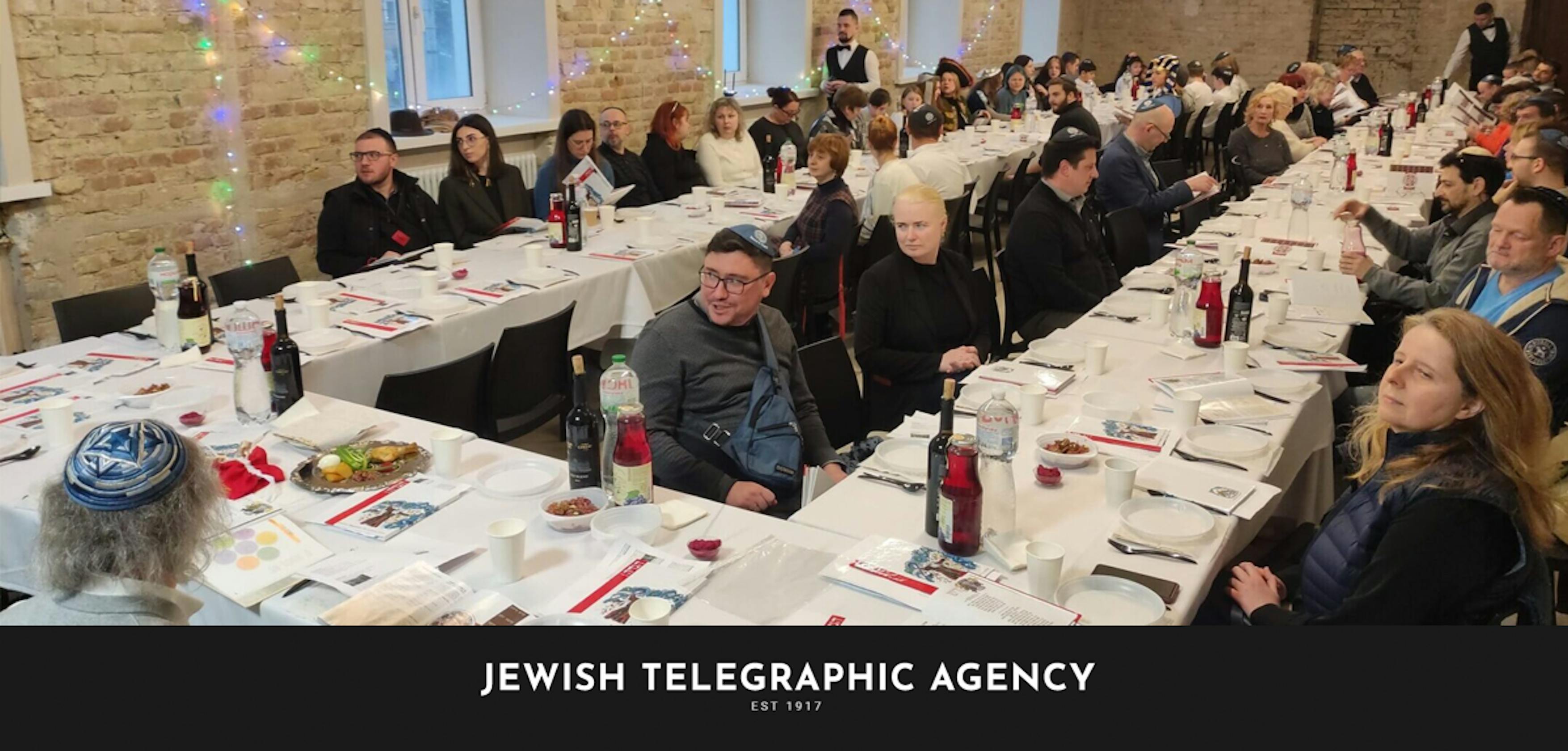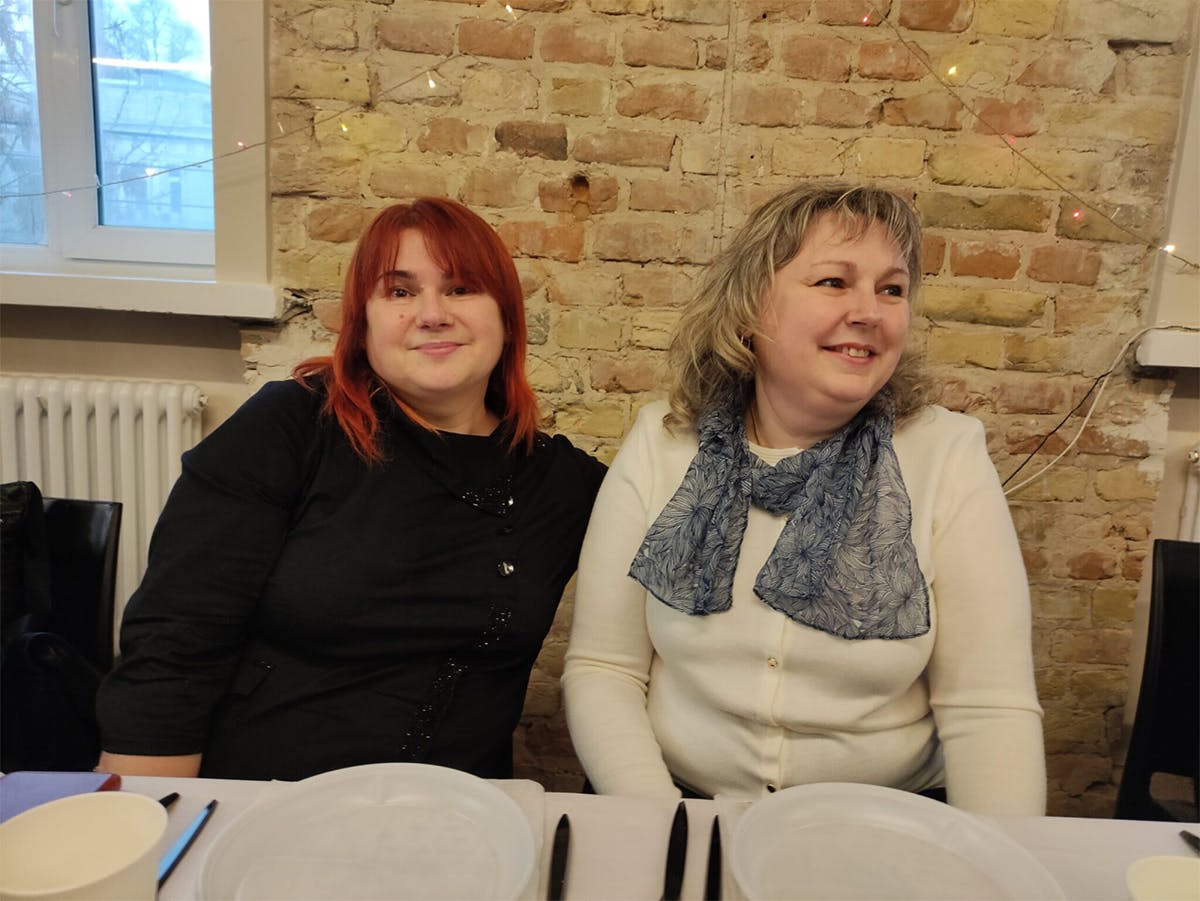
Published on JEWISH TELEGRAPHIC AGENCY
KYIV, Ukraine (JTA) — Yuliia Krainiakova fled her home in Kharkiv, Ukraine, after Russian troops invaded last year and made her way to Berlin, where she and her daughters settled for 10 months with the help of Jewish organizations.
After returning to Kharkiv several months ago, she hoped to experience some of the Jewish gatherings that had been a beacon during a time of turmoil — but her city, Ukraine’s second-largest, has continued to be shelled regularly, making safety a more pressing priority than Jewish communal life.
“Due to the war, it is difficult to find in Kharkiv,” she told the Jewish Telegraphic Agency on Tuesday. “So we decided to come to Kyiv for Passover seder, so we could have a Jewish experience here.”
Krainiakova, her husband and her two daughters were among dozens of Jews from Kharkiv who made the roughly six-hour train journey to Ukraine’s capital on Tuesday for a seder organized by Midreshet Schechter, which in partnership with Masorti Olami operates all the Conservative communities in Ukraine.
On Wednesday, they sat down at a large U-shaped table, festooned with all the trappings of the traditional seder, for a festive meal whose main concession to the war was that few attendees were in their home city.
Rabbi Irina Gritsevskaya directs Midreshet Schechter and has traveled to Ukraine multiple times over the last year from her home in Israel to support holiday celebrations there, while also teaching classes throughout the year online to students at Shaalvim Jewish Day School in Kharkiv. She said the Passover story, or maggid, was especially resonant for Ukrainian Jews who have endured more than a year of war.
“The maggid is going to be centered on going to trauma, because Pesach is actually a story of going through trauma, through the trauma of losing our Temple, our Beit Hamikdash,” Gritsevskaya said. “Now we are dealing with a different trauma, so the question is, how can we learn from the story that happened many, many years ago and connect it to today so we learn the lessons of hope and rehabilitation.”
Last year, Passover took place less than two months into the war, meaning that families were dispersed, supplies were hard to come by and any planning could easily be thrown into disarray as conditions changed. Still, between Chabad and the American Jewish Joint Distribution Committee, or JDC, the country was home to multiple public seders, some held in hotels or earlier in the day to accommodate emergency curfews.

This year, life in Ukraine has settled into a new normal in which Ukrainians can reasonably plan for the future, despite continuous blackouts and ongoing shelling in some cities. Passover observances will take a more typical form, with Chabad, the main organizer of Jewish life in many Ukrainian cities, holding 90 community seders and distributing Passover supplies to 30,000 people.
Adding to the new normal is the fact that hundreds of thousands of Ukrainians who left in the frightening early days have returned home.
That includes some of the families at Kharkiv’s Shaalvim school, which remains online because of the ongoing threat of shelling. Their trip to the Conservative synagogue in Kyiv offers a rare opportunity to be together.
“The idea to meet and spend time with each other is very exciting for them after all this time staying at home,” their teacher Svetlana Maslova said shortly after the group arrived on Tuesday.
Besides forcing the kids to receive their education remotely and secluded at home, the 120 children enrolled in the Shaalvim school have been experiencing recurrent blackouts for months, caused by shelling or by Russian strikes on Ukraine’s energy infrastructure. “At some point we had two full days without power,” Maslova said.
Shaalvim has provided a source of stability during a year of upheaval, parents said. Alla Gusak, who traveled to Kyiv with her 11-year-old daughter, lived before the war in Chuhuiv, a town about 25 miles southeast of Kharkiv that was a prime target for Russian troops because it houses a Ukrainian air force base. Russia briefly occupied the city early in the war.
“We were bombed and survived and managed to get out by miracle,” said Gusak. She added that their family home was heavily damaged and said another property in the family, in Izium, was rendered unusable along with the local medical clinic and schools while the Russian army occupied that city. “We cannot even go there because there are mines everywhere.”
Gusak and her husband worked in agriculture, but now there are mines strewn across the fields they once sowed. So even with its classes online, the Shaalvim Jewish school is of great help for her daughter to go through the horrors of this war, she said.
“What Jewish school gives us is actually family,” said Natalya Kupin, whose 11-year-old daughter attends the school. “It unites our kids, it gives us tradition and that’s what other people and nations also need, a basic tradition, because that’s what gives us the ability to be together.”
In the room where preparations were underway for the seder Tuesday, a costume Pharoah headdress hung in a corner, ready for a festive meal with lots of flourishes. Gritsevskaya said she had discussed the seder in advance with her students, and they would have an opportunity to reflect on the meaning of liberation in their own lives. She also said that while the preparation for the journey and the seder had been extensive, she didn’t know everything that would happen.
“The kids also prepared a show, a spectacle, about Yetziat Mitzrayim [leaving Egypt], which I have not seen,” Gritsevskaya said. “That’s a surprise for me.”
Receive the latest stories, updates and event notifications.

We are Masorti Olami, the official International Movement of Masorti/Conservative Judaism, based in Jerusalem, Israel.
Engage
Contact Us
Masorti Olami
32 General Pierre Koenig, 4th Floor
Jerusalem 93469, Israel
E: mail@masortiolami.org
T: +972 (2) 624-7106

